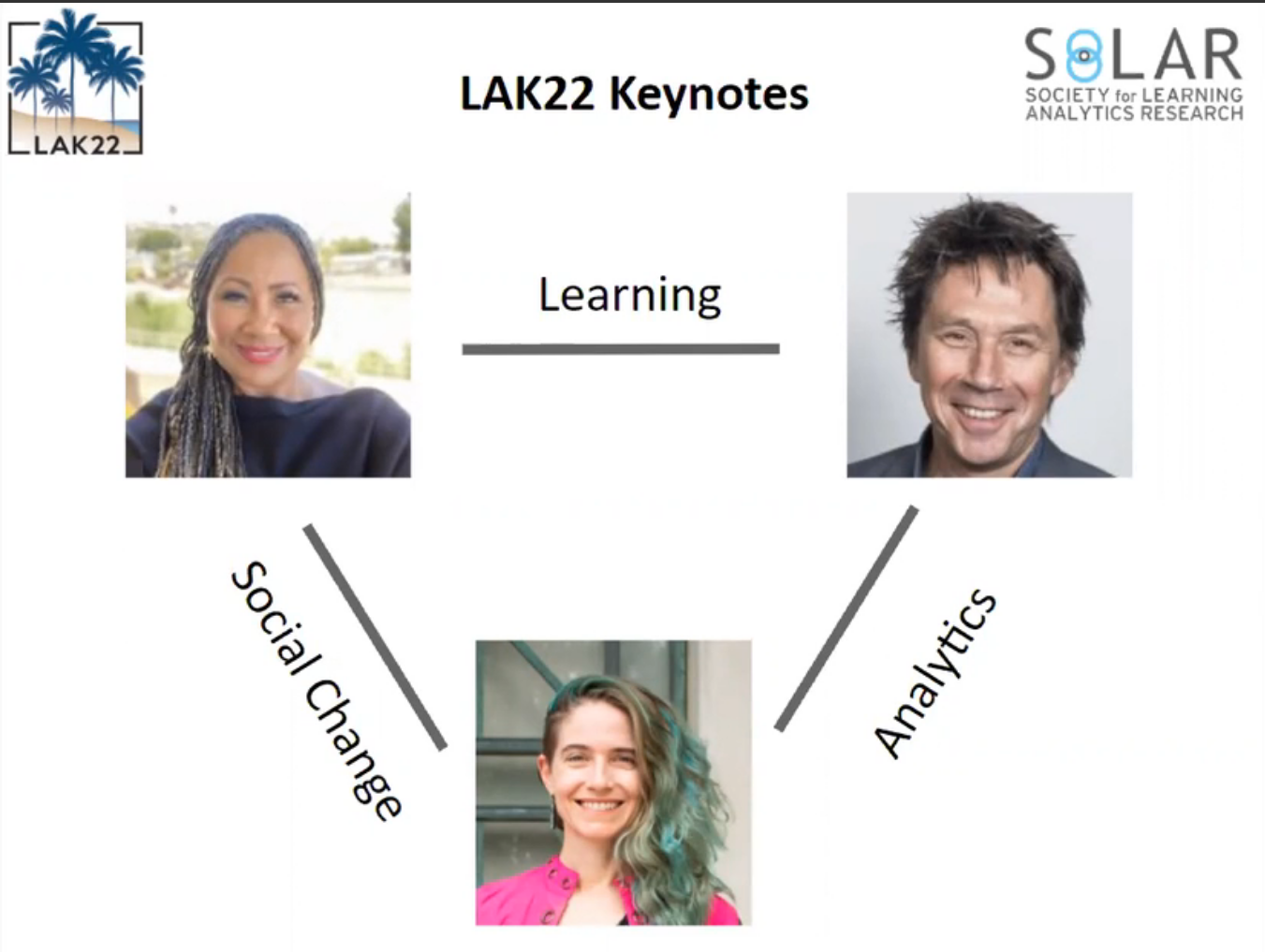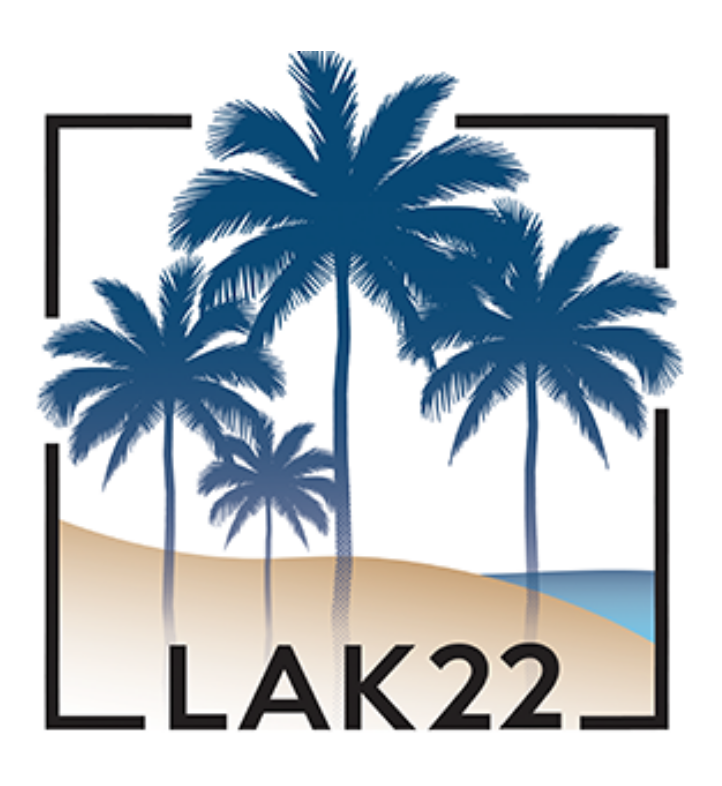The 12th International Learning Analytics and Knowledge conference, the third online event. A report of the conference by Manuel Valle Torre
 With almost 600 participants, LAK22 is the third online edition of the Learning Analytics and Knowledge conference, and it's also my third time at LAK (they organize it really well, but I'd love to do the next in person!). This year the theme was Learning Analytics for Transition, Disruption and Social Change, and it is clear from the Keynotes. The first one being The JEDI LAK Educational Interface -Justice, Equity, Diversity and Inclusion (JEDI)- by Dr. Lorri J. Santamaría, the second by Professor Catherine D'Ignazio - What does feminist data science look like?, and the third by Professor Pierre Dillenbourg - Classroom Analytics for Smoothening Orchestration. But it is also prevalent in the discussion after every session, where the questions are about the potential impact and implications of the presented work, how to make sure that the technology or algorithm shown considers all learners, and about the ways that others can apply and build on the shown approach to broaden their own work.
With almost 600 participants, LAK22 is the third online edition of the Learning Analytics and Knowledge conference, and it's also my third time at LAK (they organize it really well, but I'd love to do the next in person!). This year the theme was Learning Analytics for Transition, Disruption and Social Change, and it is clear from the Keynotes. The first one being The JEDI LAK Educational Interface -Justice, Equity, Diversity and Inclusion (JEDI)- by Dr. Lorri J. Santamaría, the second by Professor Catherine D'Ignazio - What does feminist data science look like?, and the third by Professor Pierre Dillenbourg - Classroom Analytics for Smoothening Orchestration. But it is also prevalent in the discussion after every session, where the questions are about the potential impact and implications of the presented work, how to make sure that the technology or algorithm shown considers all learners, and about the ways that others can apply and build on the shown approach to broaden their own work.
This conference also showed an interesting range on the use of technology, for example, in the session on Feedback and Learning Analytics, Antonette Shibani presented Questioning learning analytics? Cultivating critical engagement as student automated feedback literacy, where they created an evaluation exercise for learners to analyse automated feedback on essay writing, to understand their critical engagement with the system. While the automated feedback system, AcaWriter, uses modern text analytics, the evaluation exercise was executed on paper, allowing learner participation and a rich analysis. On the other hand, Siqi Han presented Enhancing Programming Knowledge Tracing by Interacting Programming Skills and Student Code, using several layers of deep learning to model the students' mastery level in multiple skills in programming exercises. Their data set was a selection of basic coding challenges from the CodeForces platform. Their procedure starts by obtaining code embedding’s from the abstract syntax tree (AST), which were then processed with their interaction with the skills required to complete each task using a Long Short-Term Memory neural network, to finally predict the level of knowledge of a student for each skill given their code snippet.
 In Learning Analytics, the learner should always be in the centre, Jeremy Tzi-Dong Ng and Zuo Wang presented: Needs Analysis and Prototype Evaluation of Student-facing LA Dashboard for Virtual Reality Content Creation, where they describe their process to evaluate the needs of learners when creating cultural heritage stories in virtual reality. They guided an interview process using self-regulated learning as their underpinning theory, and found out that learners require both support in their self-regulation, for instance with progress and framing indicators, but also specific to the task, such as a summary of their story elements and assistance with metadata. In another presentation, Stanislav Pozdniakov talked about The Question-driven Dashboard: How Can We Design Analytics Interfaces Aligned to Teachers' Inquiry?, involving teachers in the design process of a dashboard by leading them in a sense making process: presenting available data, asking questions and responding them with data, and finally defining educational and pedagogical actions to execute. Even when co-designing tools for themselves, teachers mentioned that a key aspect in their dashboards is that this support should not come at expense of students' privacy.
In Learning Analytics, the learner should always be in the centre, Jeremy Tzi-Dong Ng and Zuo Wang presented: Needs Analysis and Prototype Evaluation of Student-facing LA Dashboard for Virtual Reality Content Creation, where they describe their process to evaluate the needs of learners when creating cultural heritage stories in virtual reality. They guided an interview process using self-regulated learning as their underpinning theory, and found out that learners require both support in their self-regulation, for instance with progress and framing indicators, but also specific to the task, such as a summary of their story elements and assistance with metadata. In another presentation, Stanislav Pozdniakov talked about The Question-driven Dashboard: How Can We Design Analytics Interfaces Aligned to Teachers' Inquiry?, involving teachers in the design process of a dashboard by leading them in a sense making process: presenting available data, asking questions and responding them with data, and finally defining educational and pedagogical actions to execute. Even when co-designing tools for themselves, teachers mentioned that a key aspect in their dashboards is that this support should not come at expense of students' privacy.
